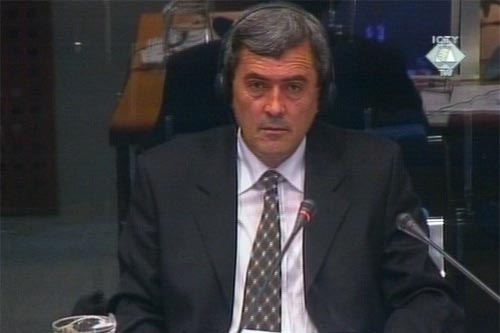Home
PRICE OF “MR. NICE’S KINDNESS”
Having previously relied on the evidence of a police inspector at the trial of former KLA members charged with the crimes in Lapusnik, the prosecution now has to challenge the credibility of the same or similar evidence, presented by Jasovic in the course of Slobodan Milosevic’s defense case
 Dragan Jasovic, witness in the Milosevic trial
Dragan Jasovic, witness in the Milosevic trial The Office of the Prosecutor has put itself in a very strange situation with witness Dragan Jasovic, police inspector from Urosevac, who had been investigating KLA activities in 1998 and 1999. After first relying on his evidence against former KLA members charged with the crimes in the Lapusnik camp, the prosecution will now try to challenge the credibility of the same or similar evidence presented by Jasovic in the course of Slobodan Milosevic's defense case.
Jasovic appeared at the Milosevic trial “thanks to Mr. Nice’s kindness,” as the accused himself admitted. Nice had alerted Milosevic to Jasovic’s testimony in the Lapusnik camp; as Judge Robinson said, this was in line with “the highest standards of ethics of the legal profession.”
The compliments of the judge and the accused do not make it easier for prosecutor Nice. He now has to challenge the credibility of the same or similar documents his colleagues relied on in the Lapusnik case. Some 90 documents originating from the Urosevac SUP about KLA activities in 1998 and 1999 were tendered during Jasovic’s testimony in the Milosevic case. About twenty of them relate to the events in the village of Racak in January 1999. The prosecutor accepted yesterday that 30 of the 40 victims in Racak, whose names are listed in the indictment against Milosevic, were also listed in the Urosevac SUP documents as KLA members or collaborators. Now he has to persuade the judges, in his cross-examination, that the witness and his documents cannot be trusted.
Despite the opposition of the accused and his assigned counsel, the judges granted the prosecutor’s request to postpone the cross-examination, which would enable him to investigate the witness and the documents tendered into evidence by Milosevic. Dragan Jasovic will continue his testimony on 17 May.
After the police inspector, Milosevic called to the witness stand a former security officer from Pec, Zvonimir Gvozdenovic. His son Vukota was killed in an attack on a café called Panda on 14 December 1998. Five other youths of Serbian ethnic origin were also killed in the incident. Gvozdenovic described the perpetrators of the crime as “a Siptar mob gone berserk, not soldiers”. In addition to that incident, Gvozdenovic testified about the mass exodus of Albanians from Pec in March 1999. He claims this was done under pressure of “Albanian agitators who went from house to house, forcing people to leave.” According to him, this had a two-fold goal: to create an impression in the world public opinion that this was a humanitarian catastrophe and to launch air strikes against Serbs.
In the cross-examination, prosecutor Daniel Saxon confronted Gvozdenovic with testimony of his fellow citizens of Albanian origin who testified in the prosecution case and the conclusions reached by the Human Rights Watch, indicating that “one of the best organized ethnic cleansing operations in Kosovo” were carried out in Pec in late March 1999. Gvozdenovic was unable to explain how the “Albanian agitators” were able to organize so many buses and trucks to transport the people to the border, why the Albanians set fire to their own homes as they left and plundered and destroyed their own business premises and why they left all their identification documents at the border.
The prosecutor put it to Gvozdenovic that he had in fact participated in the deportation of Catholic Albanians from Pec in March 1999 as a reserve police officer and a member of a paramilitary formation, but the witness denied ever having been a reserve police officer or a member of any paramilitary force. When the prosecutor showed him the list of the “reserve police squad in the Centar local commune”, containing the name of Zvonimir Gvozdenovic, the witness first said that “there is another man by the same name” in Pec. However, when the prosecutor noted that there was an address next to the name, Gvozdenovic agreed that this was in fact him, claiming he did “not know how the name got onto that list”.
After this answer, the prosecutor did not have any further questions for the witness, apart from asking that the list of reserve police officers be admitted into evidence. Slobodan Milosevic's defense case will continue on Wednesday, 4 May 2005.
Linked Reports
- Case : Milosevic Slobodan - "Kosovo, Croatia and Bosnia"
- 2005-04-26 PROSECUTOR ACCEPTS MILOSEVIC’S LIST OF VICTIMS FROM RACAK
- 2005-04-25 MILOSEVIC’S RELATIONSHIP WITH THE “SERBIAN RESISTANCE” IN KOSOVO
- 2005-04-19 MILOSEVIC’S WITNESSES CHALLENGE THE TRIBUNAL’S AUTHORITY AGAIN
- 2005-05-04 MILOSEVIC GOES INTO EXTRA TIME
- 2005-05-05 A DOCUMENT WITH A WRONG TITLE
- 2005-05-06 WHO KILLED THE PRISONERS IN DUBRAVA
